虚拟语气和倒装句笔记
语法:虚拟语气和倒装句
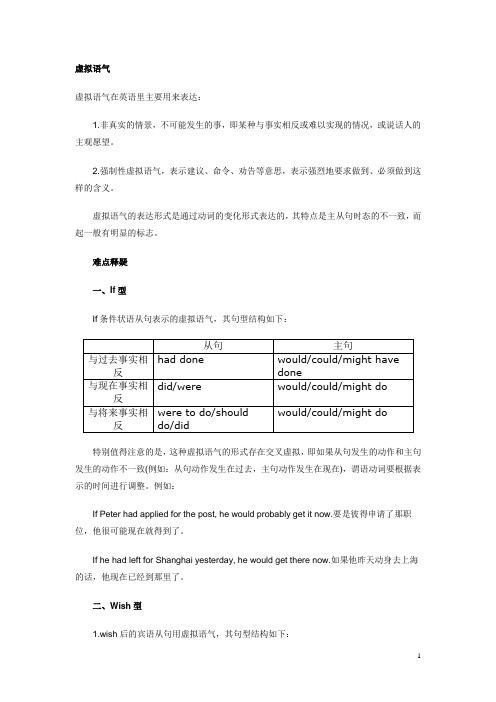
虚拟语气虚拟语气在英语里主要用来表达:1.非真实的情景,不可能发生的事,即某种与事实相反或难以实现的情况,或说话人的主观愿望。
2.强制性虚拟语气,表示建议、命令、劝告等意思,表示强烈地要求做到、必须做到这样的含义。
虚拟语气的表达形式是通过动词的变化形式表达的,其特点是主从句时态的不一致,而起一般有明显的标志。
难点释疑一、If型If条件状语从句表示的虚拟语气,其句型结构如下:特别值得注意的是,这种虚拟语气的形式存在交叉虚拟,即如果从句发生的动作和主句发生的动作不一致(例如:从句动作发生在过去,主句动作发生在现在),谓语动词要根据表示的时间进行调整。
例如:If Peter had applied for the post, he would probably get it now.要是彼得申请了那职位,他很可能现在就得到了。
If he had left for Shanghai yesterday, he would get there now.如果他昨天动身去上海的话,他现在已经到那里了。
二、Wish型1.wish后的宾语从句用虚拟语气,其句型结构如下:与过去事实相反wish that 从句的谓语动词用had done与现在事实相反wish that 从句的谓语动词用did与将来事实相反wish that 从句的谓语动词用would/could do例如:I wish they would change the menu.他们要是改变一下菜单就好了。
I wish I hadn’t spent so much money.我要是没花那么多的钱就好了。
同样地,在as if/as though引导的宾语从句中和以if only引导的带有感叹色彩的虚拟语气句子中,谓语动词与wish引导的宾语从句中的虚拟形式相同。
2.由if only 引导的虚拟语气与过去事实相反if only 谓语动词用had done与现在事实相反if only 谓语动词用did例如:If only she had asked someone’s advice! 她要是征求了别人的意见就好了!3.由as if/as though 引导的虚拟语气与过去事实相反as if/as though谓语动词用had done与现在事实相反as if/as though谓语动词用did例如:He talks about Rome as if he had been there himself.谈论起罗马来就像他去过似的。
高考必背考点(虚拟,倒装)
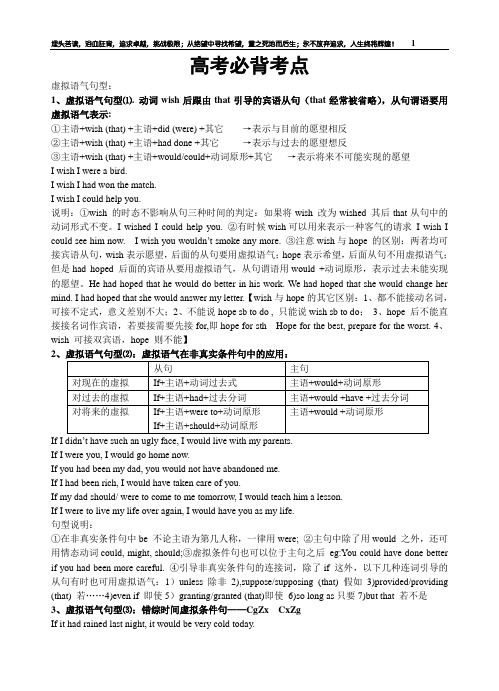
埋头苦读,浴血狂背,追求卓越,挑战极限;从绝望中寻找希望,置之死地而后生;永不放弃追求,人生终将辉煌!1高考必背考点虚拟语气句型:1、虚拟语气句型⑪. 动词wish后跟由that引导的宾语从句(that经常被省略),从句谓语要用虚拟语气表示:①主语+wish (that) +主语+did (were) +其它→表示与目前的愿望相反②主语+wish (that) +主语+had done +其它→表示与过去的愿望想反③主语+wish (that) +主语+would/could+动词原形+其它→表示将来不可能实现的愿望I wish I were a bird.I wish I had won the match.I wish I could help you.说明:①wish 的时态不影响从句三种时间的判定:如果将wish 改为wished 其后that从句中的动词形式不变。
I wished I could help you. ②有时候wish可以用来表示一种客气的请求I wish I could see him now. I wish you wouldn’t smoke any more. ③注意wish与hope 的区别:两者均可接宾语从句,wish表示愿望,后面的从句要用虚拟语气;hope 表示希望,后面从句不用虚拟语气;但是had hoped 后面的宾语从要用虚拟语气,从句谓语用would +动词原形,表示过去未能实现的愿望。
He had hoped that he would do better in his work. We had hoped that she would change her mind. I had hoped that she would answer my letter.【wish与hope的其它区别:1、都不能接动名词,可接不定式,意义差别不大;2、不能说hope sb to do , 只能说wish sb to do;3、hope 后不能直接接名词作宾语,若要接需要先接for,即hope for sth Hope for the best, prepare for the worst. 4、wish 可接双宾语,hope 则不能】2If I didn’t have such an ugly face, I would live with my parents.If I were you, I would go home now.If you had been my dad, you would not have abandoned me.If I had been rich, I would have taken care of you.If my dad should/ were to come to me tomorrow, I would teach him a lesson.If I were to live my life over again, I would have you as my life.句型说明:①在非真实条件句中be 不论主语为第几人称,一律用were; ②主句中除了用would 之外,还可用情态动词could, might, should;③虚拟条件句也可以位于主句之后eg:You could have done better if you had been more careful. ④引导非真实条件句的连接词,除了if 这外,以下几种连词引导的从句有时也可用虚拟语气:1)unless 除非2),suppose/supposing (that) 假如3)provided/providing (that) 若……4)even if 即使5)granting/granted (that)即使6)so long as只要7)but that 若不是3、虚拟语气句型⑬:错综时间虚拟条件句——CgZx CxZgIf it had rained last night, it would be very cold today. 2If I had taken your advice, I should have no trouble with the work now.If you had married him, you would be the wife of a gas station attendant instead of the wife of a chief executive office.My dear, if had married him, he would be the chief executive officer and you would be the gas station attendant.If I were you, I would have gone to the film last night.If I didn’t love her, I wouldn’t have married.说明:错综时间条件句中,特别注意时间状语,在这种情况下必须明确给出时间或通过上下文可以看出时间不同,否则就按虚拟语气句型(3)的形式固定搭配使用。
虚拟语气和倒装句讲解
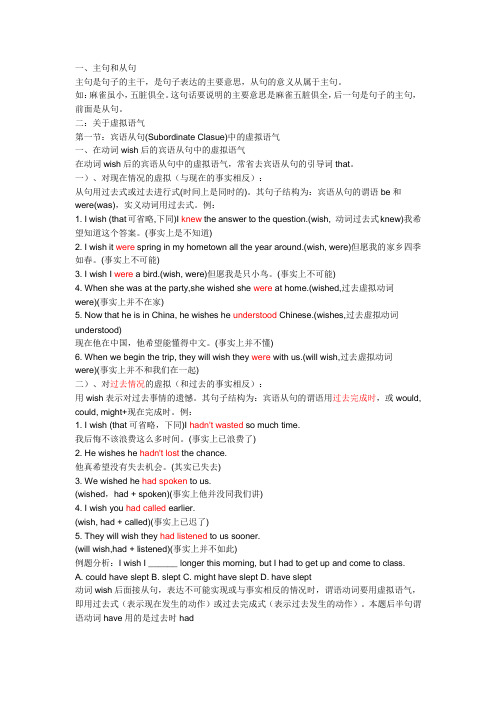
一、主句和从句主句是句子的主干,是句子表达的主要意思,从句的意义从属于主句。
如:麻雀虽小,五脏俱全。
这句话要说明的主要意思是麻雀五脏俱全,后一句是句子的主句,前面是从句。
二:关于虚拟语气第一节:宾语从句(Subordinate Clasue)中的虚拟语气一、在动词wish后的宾语从句中的虚拟语气在动词wish后的宾语从句中的虚拟语气,常省去宾语从句的引导词that。
一)、对现在情况的虚拟(与现在的事实相反):从句用过去式或过去进行式(时间上是同时的)。
其句子结构为:宾语从句的谓语be和were(was),实义动词用过去式。
例:1. I wish (that可省略,下同)I knew the answer to the question.(wish, 动词过去式knew)我希望知道这个答案。
(事实上是不知道)2. I wish it were spring in my hometown all the year around.(wish, were)但愿我的家乡四季如春。
(事实上不可能)3. I wish I were a bird.(wish, were)但愿我是只小鸟。
(事实上不可能)4. When she was at the party,she wished she were at home.(wished,过去虚拟动词were)(事实上并不在家)5. Now that he is in China, he wishes he understood Chinese.(wishes,过去虚拟动词understood)现在他在中国,他希望能懂得中文。
(事实上并不懂)6. When we begin the trip, they will wish they were with us.(will wish,过去虚拟动词were)(事实上并不和我们在一起)二)、对过去情况的虚拟(和过去的事实相反):用wish表示对过去事情的遗憾。
英语虚拟与倒装用法
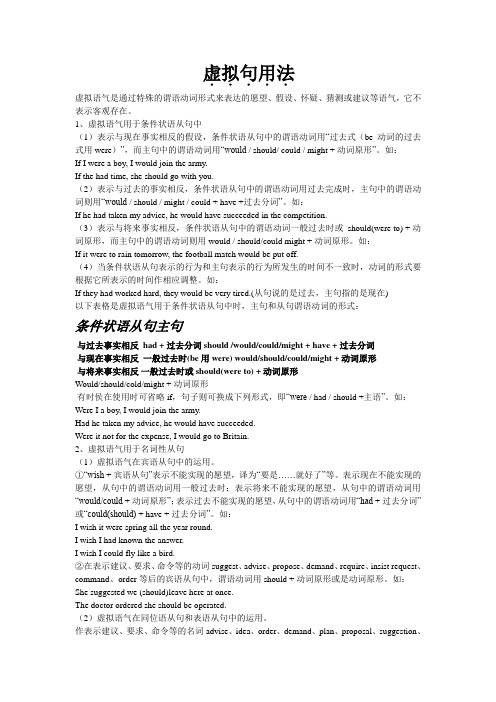
虚拟句用法.....虚拟语气是通过特殊的谓语动词形式来表达的愿望、假设、怀疑、猜测或建议等语气,它不表示客观存在。
1、虚拟语气用于条件状语从句中(1)表示与现在事实相反的假设,条件状语从句中的谓语动词用“过去式(be动词的过去式用were)”,而主句中的谓语动词用“would / should/ could / might + 动词原形”。
如:If I were a boy, I would join the army.If the had time, she should go with you.(2)表示与过去的事实相反,条件状语从句中的谓语动词用过去完成时,主句中的谓语动词则用“would / should / might / could + have +过去分词”。
如:If he had taken my advice, he would have succeeded in the competition.(3)表示与将来事实相反,条件状语从句中的谓语动词一般过去时或should(were to) + 动词原形,而主句中的谓语动词则用would / should/could might + 动词原形。
如:If it were to rain tomorrow, the football match would be put off.(4)当条件状语从句表示的行为和主句表示的行为所发生的时间不一致时,动词的形式要根据它所表示的时间作相应调整。
如:If they had worked hard, they would be very tired.(从句说的是过去,主句指的是现在)以下表格是虚拟语气用于条件状语从句中时,主句和从句谓语动词的形式:条件状语从句主句与过去事实相反 had + 过去分词 should /would/could/might + have + 过去分词与现在事实相反一般过去时(b e用were) would/should/could/might + 动词原形与将来事实相反一般过去时或should(were to) + 动词原形Would/should/cold/might + 动词原形有时侯在使用时可省略if,句子则可换成下列形式,即“were / had / should +主语”。
高中英语高考语法知识整理复习(虚拟语气+倒装句)

高考英语虚拟语气一、虚拟条件句中的虚拟语气1、表示与现在事实相反的情况从句:If+主语+did (be动词用were)主句:主语+ should/would/might/ could + doIf I were you, I would take an umbrella.如果我是你,我会带把伞。
(事实:我不可能是你)If I knew his telephone number, I would tell you.如果我知道他的电话号码,我就会告诉你。
(事实:不知道)If there were no air or water, there would be no living things on the earth.如果没有水和空气,地球上就不会有生物。
(事实:地球上既有空气也有水)2、表示与过去事实相反的情况从句:If+主语+ had + done主句:主语+should/would/might/could+have doneIf I had got there earlier, I should/would have met her.如果我早到那儿,我就会见到她(事实:去晚了)。
If he had taken my advice, he would not have made such a mistake.如果他听我的劝告的话,就不会犯这样的错误了。
(事实:没有听我的话)3、表示与将来事实相反的情况从句:①if+主语+were to do②if+主语+should+do③if+主语+过去式(be动词用were)主句:主语+should/would/might/could+doIf he should come here tomorrow, I would talk to him.如果他明天来这儿的话,我就跟他谈谈。
(事实:不可能来)If there were a heavy snow next Sunday, we would go skating.如果下周日下大雪,我们就去滑冰。
语法复习:虚拟语气和倒装句综合
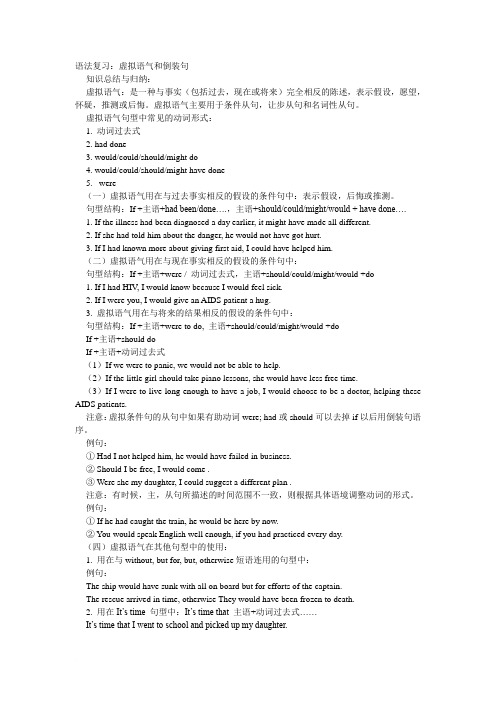
语法复习:虚拟语气和倒装句知识总结与归纳:虚拟语气:是一种与事实(包括过去,现在或将来)完全相反的陈述,表示假设,愿望,怀疑,推测或后悔。
虚拟语气主要用于条件从句,让步从句和名词性从句。
虚拟语气句型中常见的动词形式:1. 动词过去式2. had done3. would/could/should/might do4. would/could/should/might have done5. were(一)虚拟语气用在与过去事实相反的假设的条件句中:表示假设,后悔或推测。
句型结构:If +主语+had been/done….,主语+should/could/might/would + have done….1. If the illness had been diagnosed a day earlier, it might have made all different.2. If she had told him about the danger, he would not have got hurt.3. If I had known more about giving first aid, I could have helped him.(二)虚拟语气用在与现在事实相反的假设的条件句中:句型结构:If +主语+were / 动词过去式,主语+should/could/might/would +do1. If I had HIV, I would know because I would feel sick.2. If I were you, I would give an AIDS patient a hug.3. 虚拟语气用在与将来的结果相反的假设的条件句中:句型结构:If +主语+were to do, 主语+should/could/might/would +doIf +主语+should doIf +主语+动词过去式(1)If we were to panic, we would not be able to help.(2)If the little girl should take piano lessons, she would have less free time.(3)If I were to live long enough to have a job, I would choose to be a doctor, helping these AIDS patients.注意:虚拟条件句的从句中如果有助动词were; had或should可以去掉if以后用倒装句语序。
初三语法讲解情态动词倒装和虚拟语气的用法详解
初三语法讲解情态动词倒装和虚拟语气的用法详解情态动词和倒装结构情态动词是一类特殊的助动词,用于表示说话人的意愿、能力、推测等情态。
常见的情态动词包括can,could,may,might,shall,should,will,would,must等。
在某些情况下,情态动词与主语之间可以发生倒装,以强调主语、表示感叹或表示紧迫性。
1. 情态动词加入倒装情态动词的倒装结构通常由情态动词+主语构成,主谓倒装。
这种结构常用于以下几个情境:a) 表示强调和感叹例如:Never have I seen such a beautiful sunset. 我从未见过这样美丽的日落。
How brave he is! 他真勇敢!b) 表示建议或命令例如:May you have a pleasant journey! 祝你旅途愉快!Should you need any assistance, please contact us. 如需帮助,请联系我们。
c) 表示条件例如:Were he here, he would help us. 如果他在这里,他会帮助我们的。
2. 情态动词与not一起的倒装当情态动词与not连用时,可以将not置于句首,构成动词的倒装结构。
这种结构常用于祈使句或表示强调的句子中。
常见的结构有:a) Shall not例如:Shall you not tell her the truth? 你难道不应该告诉她实情吗?b) Will not例如:Will you not accompany me to the party? 你难道不会陪我去参加聚会吗?c) Can not例如:Can you not see the sign? 你难道没有看到标志吗?虚拟语气的用法虚拟语气是表示与事实相反、假设或愿望等非真实情况的一种语气。
在英语中,虚拟语气主要通过动词的形态和从句结构来表达。
1. 虚拟语气的形态a) 过去时当表示与现在或将来相反的非真实情况时,常用虚拟语气的过去时态。
虚拟语气and倒装(知识点讲解加练习题、答案)
虚拟语气1) 交叉时间虚拟:即主、从句不在同一时间,注意各自的时态。
2) 虚拟与非虚拟:即一句与事实相反,用虚拟;另一句与事实一致,用实际时态。
3) 虚拟中的倒装:如if从句中含should, had, were等,可将其置于句首,且省略if。
4) 介短、副词代替if从句:如without, but for, in the absence of (如果没有), or, otherwise 2. 表示建议、要求、劝告、命令类词+ 名从中的虚拟,从句动词:(should) do适用词群:advise, ask, demand, desire, direct(指导,要求), insist, order, propose, recommend, request, require, suggest, urge等及其它们的名词、形容词、过去分词等,后跟名从。
注意:当insist为“坚持已发生或存在的事实”,suggest为“暗示、表明”时,要用陈述语气,即实际时态。
3. wish等词+ 从句:从句时态向后退一格:即表示现在、将来用did / were / was; 表示过去用had done。
适用词群:wish, as if /though, If only(要……就好了), would rather, It is (about / high) time 等。
4. 情态动词+ have done 表虚拟:should / ought to have done 本应该做(实际没做,含“责备”之意)could / might have done 本可以做(实际未做)needn’t have done 本没必要做(实际做了)would like / love to have donewould rather have done 本来想要做某事(但未做)had better have done5. 句型:1) If it were not for…, I would / should / might / could + do“要不是……,我现在就……。
新概念英语第三册倒装句和虚拟语气讲义(1)
倒装句:陈述语序:主语+谓语倒装:谓语+主语(全部倒装)、谓语部分(助动词、be动词、情态动词)+主语+谓语剩余部分(部分倒装)口诀:“闹事”原则NAOSHIN:否定词放在句首的部分倒装:no,never,nor,little,seldom,scarcely, rarely,hardly正常语序:I hardly think you will make it.倒装语序:Hardly do think I you will make it.否定词/否定短语+谓语的be 动词/助动词/情态动词+主语+谓语剩余部分+其他否定短语放句首:in no way=under no circumstance=by no means决不正常语序:I should by no means tell him about this matter.倒装:By no means should I tell him about this matter.A:although/though/as引导让步状语从句倒装正常语序:Although/Though he was tired, he still went on with his work.倒装:1、将从句最后一个词或短语放在句首2、although改为as、thoughTired though/as he was, he still went on his work.正常语序:Although he is a little boy, he can help his mom a lot.倒装:A little boy as/though he is, he can help his mom a lot. 3、当从句出现冠词时候,倒装需要去掉正常语序:Although he is a child, he can help his mom a lot.倒装:Child as he is, he can help his mom a lot.N补充难点:not only...but (also)...倒装(倒前不倒后)正常语序:We should not only be afraid of making mistakes, but we should try to overe them.倒装:Not only should we be afraid of making mistakes, but we should try to overe them.O:Only+状语/状语从句放在句首,句子用部分倒装结构谓语的be 动词/助动词/情态动词+主语+谓语剩余部分+其他正常语序:We can learn English well only in this way.倒装:Only in this way can we learn English well.正常语序:Everything will be all right only when you have time to do it.倒装:Only when you have time to do it will everything be all right.only+人称代词不倒装:Only you can make the world seem bright.S: So、such放在句首倒装情况so+adj.It isthat we would like to play outside.such+n.so和such与后面短语合在一起看成一个整体倒装:So easy is it that a little boy can handle it.Such fine weather is it that we would like to play outside. H: 方位副词/短语放在句首,句子倒装here, there, up, down, in, then, now....Here es the bus. The bus es here.A picture hangs on the wall. On the wall hangs a picture. The bell goes there. There goes the bell.The children went out. Out went the children.A tall tree stands between the two buildings.Between the two buildings stands a tall tree.Here you are. here+人称代词:不倒装I:if省略的倒装虚拟语气if省略倒装:在虚拟中,if省略,had、should、were提前如果我是你,我不会让他走。
虚拟语气、倒装句、独立主格
虚拟语气、倒装句、独立主格一.虚拟语气虚拟语气表示说话人的主观愿望、猜疑、建议或与事实不符的假设等,而不表示客观存在的事实。
虚拟语气是由句中的谓语动词的特殊形式表示出来的。
虚拟语气主要分为与现在事实相反,与过去事实相反以及与将来事实相反三个种类。
让我们一一来看下它们的结构和用法吧!1、表示与现在事实相反的情况从句:If+主语+动词一般过去时(Be动词用were)主句:主语+ should/would/might/could+do:If I were you,I would take an umbrella.如果我是你,我会带把伞。
(事实:我不可能是你)If I knew his telephone number,I would tell you.如果我知道他的电话号码,我就会告诉你。
(事实:不知道)If there were no air or water,there would be no living things on the earth.如果没有水和空气,地球上就不会有生物。
(事实:地球上既有空气也有水)If I had any money with me,I could lend you some.如果我带钱了,我就会借给你些。
(事实:没有带钱)If he studied harder,he might pass the exam.如果他再努力些,就能通过考试了。
(事实:没有努力)If I were you,I'd wear a shirt and tie.如果我是你,我就会穿衬衫和领带。
(事实:我并不是你)2、表示与过去事实相反的情况从句:If+主语+had+done主句:主语+should/would/might/could+have doneeg:If I had got there earlier,I should/would have met her.如果我早到那儿,我就会见到她。
- 1、下载文档前请自行甄别文档内容的完整性,平台不提供额外的编辑、内容补充、找答案等附加服务。
- 2、"仅部分预览"的文档,不可在线预览部分如存在完整性等问题,可反馈申请退款(可完整预览的文档不适用该条件!)。
- 3、如文档侵犯您的权益,请联系客服反馈,我们会尽快为您处理(人工客服工作时间:9:00-18:30)。
语法
一、虚拟语气
Ⅰ.suggest;require; order; recommand; insist
sb.suggest that …(should)do
His suggestion is that…
What do you think of his suggestion that
注:suggest,insist表明、暗示
He insisted that he hadn’t made a mistake.
Ⅱ.wish
1)对现在的虚拟,用一般现在时
How I wish I were you !
2)对过去虚拟,用过去完成时
How I wish I had followed your advice.
3)对将来虚拟 could+v.原形
How I wish /If only I could fly in the sky
Ⅲ.It is (high)time that…should (should 不可省) It is necessary that…
I would rather that…
Ⅳ.隐含虚拟
But ;but for ;without ;otherwise without后一般+n.
Eg:I could have come to school on time,(but I got up late).=I got up late otherwise.
Ⅴ.虚拟条件句
If it didn’t rain tomorrow
If it shouldn’t(只能用should) rain tomorrow.
If it weren’t to rain tomorrow
Were it not to rain tomorrow…/Should it not to…
Were I you,…
从句都往过去推一个时态
Ⅵ.时间错纵
If she hadn’t stayed up all night studying,She would feel energetic now .
部分倒装
1.never,by no means,in no case,at no time
eg:①By no means will I say sorry to her.
②Never have I seen him.
2.not only…but also
3.only
1)only +adv.
eg:Only then did I realize I made a mistake.
2)Only+prep.phrase
eg:Only in this way can we solve the problem.
3)adverbid choose.
eg:Only if I am free ,can I…?
注:If only I had followed your advice yesterday.
4)seldom
5)①so/as +be/aux/modal verb+主语
Eg:He is a student,so am I.他是一个学生,我也是。
②so +be/aux/modal verb.
Eg:-She is very excellent.
-So she is.她的确是这样
③neither/nor+
Eg:I don’t know her ,nor do I care.
6)He is so clever that all of us admire him.
So clever is he that…
So +adj./adv.置于句首
7)①Although he is a child,he knows a lot .
Child as he is,he knows a lot.(表语提前)
②Athough I like her very much,I always scold her.
Much as I like her,I always scold her.(副词提前)
③Athough you might try,you will fail again.
Try as you might,you will fail again.(动词原形提前)。
